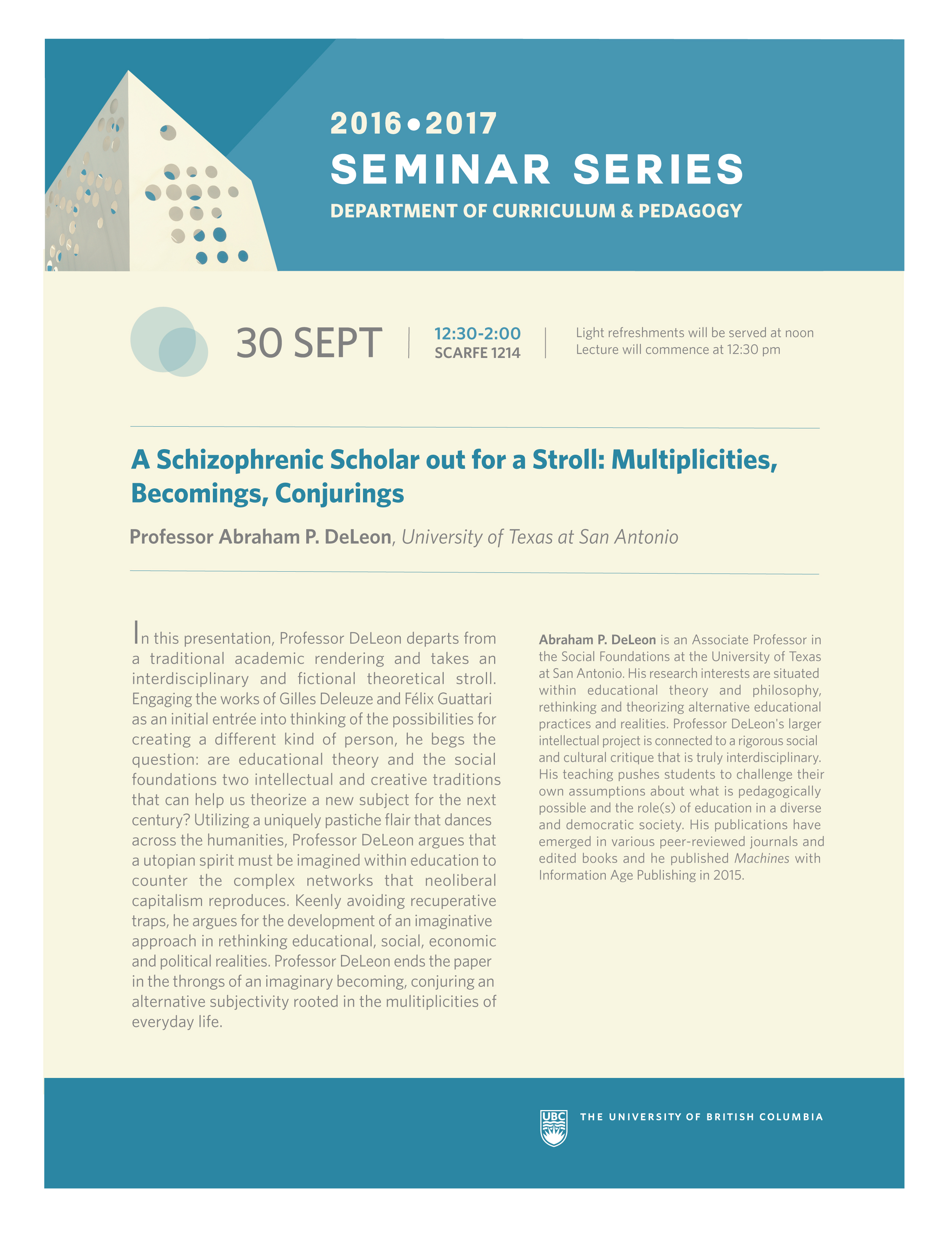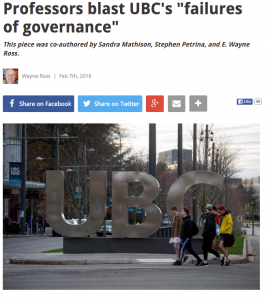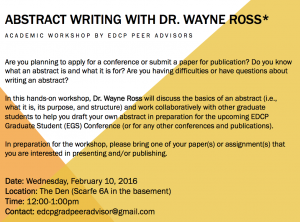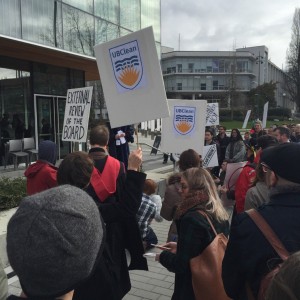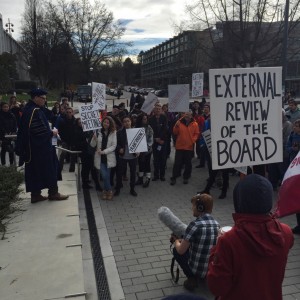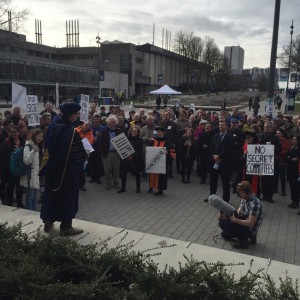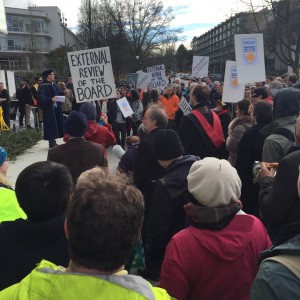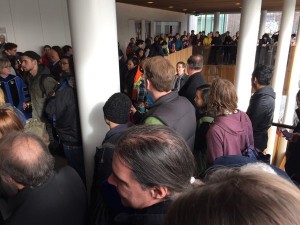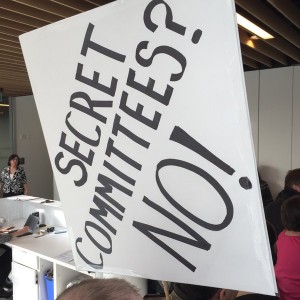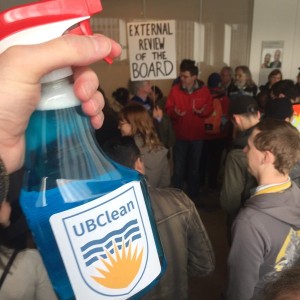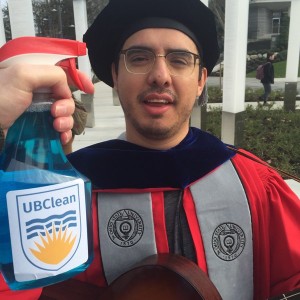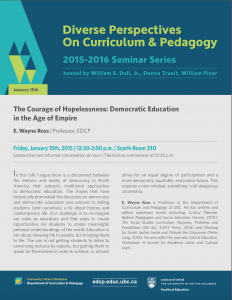Tag Archives: UBC
Comments on Academic Freedom at the University of British Columbia
Comments on Academic Freedom at the University of British Columbia
Delivered at “Breakfast with the Dean” panel April 21, 2016
E. Wayne Ross, PhD
Professor
Faculty of Education
University of British Columbia
First of all I would like to thank Dean Blye Frank for inviting me to participate on this panel and thanks to all of you for coming out this morning to participate in a discussion on academic freedom.
On the surface, it’s easy to be pro-academic freedom, kind of like being for mom and apple pie. But, academic freedom is a contested issue in universities (and schools, but that is a very different matter).
The Canadian Association of University Teachers (CAUT), describes a number of major academic freedom cases in Canada ranging from the University of Manitoba blocking a documentary film that reports findings of research on genetically modified crops; to irregularities that lead to the suspension of David F. Noble’s appointment to an endowed chair at Simon Fraser University; to Mary Bryson, the Faculty’s senior associate dean, and her battle with UBC over intellectual property rights. The arbitration decision in the Bryson case is described by CAUT as “landmark in the struggle to insure that faculty, not administrators, determine the content of courses.”[1]
In recent years there has been international attention given to the academic freedom cases of Professors Norman G. Finkelstein and Steven Salaita, who lost jobs as a result of social justice scholarship and activism, in particular, criticisms of Israel’s policies toward Palestinians living under occupation.
Threats to academic freedom are real and have a long history in Canadian postsecondary education and beyond.
CAUT defines academic freedom, in part, as including:
the right, without restriction by prescribed doctrine, to freedom to teach and discuss; freedom to carry out research and disseminate and publish the results thereof; freedom to produce and perform creative works; … freedom to express one’s opinion about the institution, its administration, and the system in which one works; … Academic freedom always entails freedom from institutional censorship.
Academic freedom does not require neutrality on the part of the individual. Academic freedom makes intellectual discourse, critique, and commitment possible.
Academic staff must not be hindered or impeded in exercising their civil rights as individuals including the right to contribute to social change through free expression of opinion on matters of public interest. Academic staff must not suffer any institutional penalties because of the exercise of such rights. [2]
In short academic freedom is essential to the mission of the university.
Dean Frank asked the members of this` panel to focus on issues of academic freedom in light of the current search to fill the new UBC position of Senior Advisor to the Provosts on Academic Freedom.
My first thought was that if we have provosts who need advisors on academic freedom, maybe they shouldn’t be provosts, really. But, perhaps I’m being too glib, even for a short breakfast talk.
Of course the creation of this new advisory position is the result of controversy created by the former chair of the UBC Board of Governors, John Montalbano, when he interfered with the academic freedom of Sauder School Professor Jennifer Berdahl, after she blogged about UBC President Arvind Gupta’s “resignation” after 13 months in office.[3]
Oh, wait a minute. Let me correct myself, like many of UBC’s self-investigation exercises the external report on the Berdahl case, written by former justice Lynn Smith, did not find fault with any individual university administrators.
“No individual intended to interfere with Dr. Berdahl’s academic freedom, or made a direct attempt to do so… However, sometimes several relatively small mistakes can lead to a failure of the larger system.”
Despite whatever good intentions might lurk behind the creation of the new academic freedom advisor position – and I do believe that its existence is primarily a public relations effort – at best this position is a band-aid on a life-threatening wound and at worse it is yet another diversion – a manifestation of an ideological stance that is widely held in society and practically hegemonic in universities—liberal neutrality. I’ll briefly address both of these circumstances.
Corporatization of the University (The life-threatening wound)
The corporate takeover of education at the K-12 and postsecondary levels, facilitated is by governments that might best be described as executive committees of the rich.
The trouble begins when the framework for understanding the nature and aims of education and scholarship is as a tool vital for economic success. As Thomas Docherty argues in his book Universities at War, the university has become a servant of the national and provincial economies in the context of globalization. Its driving principles of private and personal enrichment are understood as necessary conditions of progress and modernity.
Docherty sees this circumstances as a radical impoverishment of the university’s capacities to extend human possibilities and freedoms, to seek earnestly for social justice, and to participate in the endless need for the extension of democracy. Docherty argues that we must take sides in this matter because market fundamentalists are on the march and the war is being fought not just for scholars but also for a more democratic, more just, more emancipatory way of life.
The Problem of “Liberal neutrality”
In her article “Why I’m Not a Liberal,” Robin Marie Averback argues that
“In the liberal imagination, education and accommodation are self-evident solutions, since the problem can neither be understood as a matter of brute power struggles nor as a product of structural inequality fundamental to the functioning of entire institutions … You can’t choose a side when liberalism insists there are no sides at all.”[4]
This notion, helps to explain how the Smith Report on the Berdahl academic freedom case creates a victim without a victimizer. This is a pattern played out in numerous instances at UBC in recently. See, for example, the reports on:
- the privacy breach related to documents on the Arvind Gupta imbroglio[5]
- Commerce Undergraduate Society Frosh Week “rape chants”[6]
- UBC handling of sexual assault complaints[7]
Averback reminds us of the picture book version of social justice that we often see on walls of community centres,
“In this picture book version of social justice struggle, no one ever opposes freedom’s forward march. All the oppressed need to do is rise up and assert themselves; the world they are fighting for is realized simply by the act of self-declaration.”
At UBC everybody seems to be for academic freedom. It’s like a picture book version of academic freedom. But in the all-administrative university – a phrase coined by Benjamin Ginsberg in his book The Fall of the Faculty – the response of the administration to an academic freedom crisis is the creation of yet another administrative position, aimed at educating and accommodating.
This reminds me of a comment someone made in the context of the recent UBC Board of Governors debacle(s) and the compromised Presidential Search Committee, “UBC doesn’t need a new driver, because the problem is with the car.”
Here are some academic freedom issues that the new position will like never come close to addressing:
- Intellectual property rights;
- Corporate influence on campus academic programs and research.[8]
- Faculty loss of control over academic programs (such as the teacher education program in our faculty)
- Respectful workplace statements that become instruments that encourage bullying and mobbing of faculty with dissenting points of view or who merely ask questions that make people uncomfortable;
- Middle managers, like those in Sauder, who intervene like their corporate counterparts to threaten the rank and file on issues of solidarity and criticism of management (e.g., the recent UBCFA no confidence vote);
- People like those faculty members who have warned UBC Professor Jonathan Ichikawa (sponsor of the UBCFA no-confidence vote in the Board of Governors) that his activism would negatively affect his advancement at the university;
- Students/faculty self-funding themselves;
- Administrative efforts to “right-size” academic programs;
- Tenure and promotion committees that forego evaluative reading of faculty scholarship and instead focus on impact factors or the amount of external dollars won in competitions.
When no one is understood as protecting a position of power (liberal neutrality) how do we combat these threats to academic freedom? I don’t think the answer is by appointing an advisor to the provost.
Questions for discussion:
To what degree are the new policies for academic speech inscribed in academic work, regardless of where it’s done? As the academic workplace is increasingly displaced and distributed, are academic policies displaced and distributed as well? Observed at work, monitored at home and tracked in between—these are not so much choices as the cold reality of 21st century academic work.[9]
BC Premier Christy Clark has warned provincial postsecondary institutions that they must do a better job of producing graduates who meet the needs of the private sector (2014 Throne Speech). What happens to academic freedom when universities are cast as servants to the provincial or national “economic success?”
Notes
[1] CAUT, Major Academic Freedom Cases: http://www.caut.ca/issues-and-campaigns/academic-freedom/academic-freedom-cases
[2] See full CAUT statement on academic freedom here: https://www.caut.ca/about-us/caut-policy/lists/caut-policy-statements/policy-statement-on-academic-freedom – sthash.0grFSra5.dpuf
[3] http://www.cbc.ca/news/canada/british-columbia/ubc-chair-john-montalbano-resigns-after-report-finds-academic-freedom-not-protected-1.3272776
[4] https://www.jacobinmag.com/2014/07/why-im-not-a-liberal/
[5] http://universitycounsel.ubc.ca/files/2016/03/D-Loukidelis-Report-on-UBC-FOI-Processes-final-7-Mar-16.pdf
[6] http://president.ubc.ca/files/2013/09/Fact-Finding-Report-copy.pdf
[7] http://www.cbc.ca/news/canada/ubc-sexual-assaults-complaints-expulsion-1.3328368
[8] See government appointments to UBC Board and U of Calgary/Enbridge relationship: http://www.cbc.ca/beta/news/canada/calgary/caut-ucalgary-uofc-dru-marshall-david-robinson-1.3531851
[9] See Petrina, Ross, & Mathison (2015). Threat convergence: The new academic work, bullying, mobbing and freedom. Workplace: A Journal for Academic Labor, 24, 58-69. Retrieved from http://ices.library.ubc.ca/index.php/workplace/article/view/186137/185332
Be Realistic Demand the Impossible: A Rejoinder to Peter Seixas [updated with video]
“Be Realistic Demand the Impossible”[1]
Rejoinder to Peter Siexas’s
Dangerous indeed: A response to E. Wayne Ross’ ‘Courage of hopelessness’
University of British Columbia
Department of Curriculum and Pedagogy
Seminar Series: Diverse Perspectives on Curriculum & Pedagogy
February 26, 2016
1. The “courage of hopelessness” is, perhaps ironically, an optimistic position.
The publicity blurbs for Peter’s talk stated that he would offer “a way to steer a course between the two closely related traps of hopelessness and utopianism.” This is a misreading of my use of the term “courage of hopelessness,” which is a position of some great optimism.
[Read the text of my January 15, 2016 seminar “The Courage of Hopelessness: Democratic Education in the Age of Empire.” Watch video my talk here. Watch Seixas talk, my response and Q&A with audience below.]
2. Utopia – “Be realistic demand the impossible”
We need Utopia / utopian thought more than ever because we live in a time without alternatives when neoliberal capitalism reins triumphant and uncontested.
[This circumstance is captured in Margaret Thatcher’s declarations: “There is no alternative” and “there is no such thing as society.” The latter of which was embodied in Stephen Harper’s refusal to “commit sociology,” which was an ideological attempt to prevent the identification of and responses to structural injustices that result from capitalism.]
The so-called global free market works well for the One Percent, but not for rest of humanity. In my talk, I provided some examples of the ways in which capitalism trumps democracy (pun intended).
The hegemonic system of global capitalism dominates not because people agree with it; it rules because most people are convinced “There Is No Alternative.” Indeed, as I have argued, the dominant approach to schooling and curriculum, particularly in social studies education, is aimed at indoctrinating students into this belief.
Utopian thinking allows us to consider alternatives, such as the pedagogical imaginaries which I presented in my January seminar, in attempt to open up spaces for rethinking our approaches to learning, teaching, and experiencing the world. And these imaginaries are necessary because traditional tropes of social studies curriculum (e.g., democracy, voting, democratic citizenship) are essentially lies we tell to ourselves and our students (because democracy is incompatible with capitalism; capitalist democracy creates a shallow, spectator version of democracy at best; democracy as it operates now is inseparable from empire/perpetual war and vast social inequalities).
Stephen Duncombe argues that Utopia is politically necessary even for people who do not desire an alternative society,
“Thoughtful politics depend upon debate and without someone or something to disagree with there is no meaningful dialogue, only an echo chamber…Without a vision of an alternative future, we can only look backwards nostalgically to the past, or unthinkingly maintain what we have, mired in the unholy apocalypse that is now.”
3. The Nature of Method or Inquiry
I believe the key question to be posed in social studies and one that history can help us answer is “why are things as are they are?”
[Marx’s method, dialectics, is a tool that does not necessarily require a Marxist politics or practice (class struggle), see for example the dialectical approaches of individualist libertarians Chris Sciabarra and John F. Welsh.]
What we understand about the world is determined by what the world is, who we are, and how we conduct our inquiries.
Things change. Everything in the world is changing and interacting. When studying social issues we should begin by challenging the commonsense ideas of society or particular social issues as a “thing” and consider the processes and relationships that make up what we think of as society or a social issue, which includes its history and possible futures.
Inquiries into social issues help us understand how things change and also contribute to change.
In understanding social issues and how things change it helps to “abstract” or start with “concrete reality” and break it down. Abstraction is like using camera lenses with different focal lengths: a zoom lens to bring a distant object into focus (what is the history of this?) or using a wide-angle lens to capture more of a scene (what is the social context of the issue now?)
This approach raises important questions: where does one start and what does one look for? The traditional approach to inquiry starts with small parts and attempts to establish connections with other parts leading to an understanding of the larger whole. Beginning with the whole, the system, or as much as we understand of it, and then inquiring into the part or parts of it to see how it fits and functions leads to a fuller understanding of the whole.
Analysis of present conditions is necessary, but insufficient. The problem is that reality is more than appearances and focusing on appearances, the face value of evidence from our immediate surroundings, can be misleading.
How do we think adequately about social issues, giving issues the attention and weight they deserve, without the distorting them? We can expand our notion of a social issue (or anything for that matter) to include, as aspects of what it is, both the process by which the issue has come to life and the broader interactive context in which it is found. In this way, the study of a social issue involves us in the study of its history (the preconditions and connections to the past) and the encompassing system.
Remembering, “things change,” provokes us to move beyond analyzing current conditions and historicizing social issues, to project probable or possible futures. In other words, our inquiry leads to the creation of visions of possible futures.
This process of inquiry, then, changes the way we think about a social issue in the here and now (change moves in spirals, not circles) in that we can now look for preconditions of a future in the present and use them to develop political strategies (i.e., organize for change).
4. The School and “Social Progress”
The fundamental parts of human nature include a need for creative work, for creative inquiry, for free creation without the arbitrary limiting effects of coercive institutions.
Schools are continually threatened because they are autocratic and they are autocratic because they are threatened—from within by students and critical parents and from without by various and disparate social, political, and economic interests. These conditions divide teachers from students and community and shape teachers’ attitudes, beliefs, and action.
Teachers then, are crucial to any effort to improve, reform, or revolutionize curriculum, instruction, or schools. The transformation of schools must begin with the teachers, and no program that does not include the personal and collective rehabilitation of teachers can ever overcome the passive resistance of the old order.
Schools should places that enable people to analyze and understand social problems; envision a future without those problems; and take action to bring that vision in to existence.
Social progress is enhanced when we rewrite the narrative of the triumphant individual working within the system into a story of the creation of self-critical communities of educators in schools (and people in society) working collaboratively toward transformative outcomes.
People who talk about transformational learning or educational revolution without referring explicitly to everyday life, without understanding what is subversive about learning, and love, and what is positive in the refusal of constraints, are trapped in a net of received ideas, the common-nonsense and false reality of technocrats (or worse).
Schools are alluring contradictions, harboring possibilities for liberation, emancipation, and social progress, but, as fundamentally authoritarian and hierarchical institutions, they produce myriad oppressive and inequitable by-products. The challenge, perhaps impossibility, is discovering ways in which schools can contribute to positive liberty.
That is a society where individuals have the power and resources to realize and fulfill their own potential, free from the obstacles of classism, racism, sexism and other inequalities encouraged by educational systems and the influence of the state and religious ideologies. A society where people have the agency and capacity, to make their own free choices and act independently based on reason, not authority, tradition, or dogma.
[1] These remarks were presented immediately following Seixas’ presentation and prepared without the opportunity to read the text of his talk in advance. As a result, they are based upon the abstract circulated prior to his seminar and my understanding of Seixas’ perspective based upon his published work and our interactions as faculty members at UBC.
Video of Seixas presentation, Ross response and Q&A with audience (February 26, 2016):
Peter Seixas talk: Dangerous indeed: A response to Wayne Ross’ “Courage of hopelessness”
Date: Friday, February 26th 2016
Venue: Scarfe Room 310
Time: 12:30 – 2:00 p.m.
Title: Dangerous indeed: A response to Wayne Ross’ “Courage of hopelessness”
Speaker: Dr. Peter Seixas, Professor, EDCP
Light lunch served at noon outside Scarfe room 310. The Lecture commences at 12:30 pm. There is no need to RSVP.
Abstract:
Yes, yes, the past gets in the way; it trips us up, bogs us down; it complicates, makes difficult. But to ignore this is folly, because, above all, what history teaches us is to avoid illusion and make-believe, to lay aside dreams, moonshine, cure-alls, wonder-workings, pie-in-the-sky—to be realistic.
–Tom Crick, the history teacher, in Graham Swift’s Waterland, p. 108
In his EDCP Seminar on January 15, Dr. Wayne Ross challenged commonplace notions of schools, teacher education, the subject of social studies, democracy and freedom. In this talk (text, video, powerpoint), I review the arguments and confront them as a colleague—in the department, in social studies education, and in the project of educating teachers for British Columbia schools. As the basis of my critique, I offer a theoretical framework through the concept of “historical agency,” which calls attention to the abilities of people to act individually and collectively to shape the course of history, as well as the limitations on those abilities. It offers a way to steer a course between the two closely related traps of hopelessness and utopianism. I sketch its utility specifically in relation to 1) understanding our own social and political situation, 2) thinking about the role of schools and teachers in democratic societies, 3) developing useful curriculum and pedagogy in Canada today, 4) educating student teachers in the Faculty of Education, and 5) conducting educational research that matters.
Vancouver Observer: Professors blast UBC’s “failures of governance”
The Vancouver Observer recently published a commentary co-authored by Sandra Mathison, Stephen Petrina and myself (co-directors of the Institute for Critical Education Studies) on the recent failures of governance at the University of British Columbia.
Read the piece on the Vancouver Observer site, here.
Student workshop on writing conference proposals & abstracts
UBC Faculty Association and student society call for external review of Board of Governors; Momentum gathers among faculty for UBCBoG no-confidence vote
With UBC’s crisis of administration and legitimacy growing worse, the Faculty Association has re-issued its call for an external review of the Board of Governors and its operations. Clearly, there are failures of governance and shadow systems of decision-making from the ranks of middle management to the top of the Board. The FAUBC announced today:
As the collective voice of faculty, charged with representing faculty interests and perspectives relevant to unfolding events at UBC, the Faculty Association, through its Executive, feels compelled at this time to raise a number of serious concerns. It has become clear that the University of British Columbia is in the midst of a governance crisis.
The events of the past year or so, as information about them slowly leaks out, demonstrate a failure of governance that threatens the integrity and credibility of the University. This is a singular moment in the 100-year history of UBC, the solution to which requires strong actions on the part of the Board of Governors.
We have called publicly for an external review of the Board and its operations. At this point, we re-issue this call. Such a review is essential to restore public trust in the Board. To accomplish this, the leadership for such a review must have the support of the University community – of faculty, students, staff, and alumni….
Some current members of the Board, including the Chancellor of UBC, have been shown in recent, now public, documents to have been involved in activities around the resignation of Dr. Gupta that appear to contravene standard and expected Board practices. Improper conduct of Board business is a serious matter. The former Chair of the Board, John Montalbano, has resigned. What onus of response falls on these other Board members, given these revelations?
UBCFA has posed specific questions about UBC Board practices, which include:
- In the leaked documents from last week, we have seen several examples of secret meetings without any subsequent public documentation of these meetings. Does the Board’s current practice of holding some full Board and committee meetings without published meeting dates, agendas, and motions passed (and hence of decisions taken) meet the expectations for accountability and transparency for BC public bodies, and the obligations placed on the Board under the law?
- Has the Board been properly constituting and documenting all of its committees and their work? For example, a previously unknown ad hoc committee appears to have been created to manage the Board’s interactions with Dr. Gupta in the time leading to his resignation. Where is the documentation for the motions that created this committee? What processes were used, and what records kept of these processes? How many other such committees are there? Why is it necessary to keep the existence of any committee secret? Do all Board members know about each of the ad hoc committees? Is the Board operating in a way that meets all of its obligations under the Freedom of Information and Protection of Privacy Act (FIPPA) and the general guidelines for public bodies? Is it lawful for secret committees to take actions that are not publicly recorded and not available for public scrutiny?
- Two related concerns pertain to patterns of email business conducted by Board members. First, why are all Board members not using a UBC email address for all of their Board work? Second, how does that Board ensure that the work of the Board is properly recorded and archived? For example, the University’s response to one of the Faculty Association’s Freedom of Information requests for the Chancellor’s email correspondence around a critical event claims that Mr. Gordon had no emails that were captured by this request. However, other individuals covered under this same request provided several email chains relating to the event that included multiple emails to and from Mr. Gordon. Why were Mr. Gordon’s emails, which were clearly about University business, not provided by Mr. Gordon as the law provides? How are Mr. Gordon’s emails about university business thus archived? More generally, do the email processes of the Board meet all legal obligations applicable to the Board and to UBC as a public institution?
In addition to the UBCFA’s open letter to the UBC Board, momentum is gathering among faculty for a no-confidence vote on UBC Board. A rank and file group of university faculty members are currently mounting petition for a resolution to be presented to the UBC Faculty Association Executive Committee:
Whereas the UBC Board of Governors is required by law to act in the best interests of the University (BC University Act 19.2);
and whereas it has come to light that the Board has held secret, unannounced meetings of the Board, leaving no documentation of its activities;
and whereas Board members have formed secret ad hoc committees in which governance activities have been pursued without oversight and contrary to policy and procedural norms;
and whereas these committees and the Board have taken decisions or engaged in actions—such as declaring no confidence in the President with no formal review or input from faculty, declaring full confidence in the Chair after his role in interfering with a faculty member’s academic freedom, interpreting fiduciary duty to the university as pertaining to donors rather than its faculty, students, and staff—that are not obviously in the best interests of the University;
and whereas the Board has declined to explain such actions to the University community;
and whereas, consequently, we faculty members in good standing at UBC find that we cannot know—indeed, we have strong reason to doubt—that the Board has been operating in accordance with its legal obligations to the people of British Columbia;
therefore be it resolved that the Executive of the UBC Faculty Association, as soon as possible, bring a motion to its membership expressing no confidence in the UBC Board of Governors.
The UBC Alma Mater Society also publicly called for a review. The AMS urges the Board to enact the following changes:
- That the incoming Chair of the Board of Governors instigate an external review process into governance practices;
- That the Board of Governors delay approving any candidate proposed by the Presidential Search Committee until such time as the suggested external review is complete and incorporated.
UBC’s 100th year is turning into a year of memorial events, but it’s not the planned superficial PR.
UBC faculty, staff, and students protest Board of Governors meeting #UBCClean [UPDATED]
UBC faculty are not generally a rowdy bunch, but there were a couple of hundred out today protesting the Board of Governors meeting and demanding UBC management and Board accountability.
UBC faculty, staff and students were protesting the UBC Board of Governors Meeting held on campus at the R. H. Lee Alumni Centre, and demanding a clean up of the Board and university administration, in particular that:
- the Board of Governors stops holding secret, undocumented meetings
- the Board honours its duty to operate in a transparent and accountable fashion
- an external review of its past practices takes place immediately.
For more background on the issues leading to this protest, see this letter from the Faculty Association of UBC, which details how the BoG has, among other things, held committee meetings that left no official record, and made decisions about personnel matters without formal assessments or performance reviews.
News coverage of protest:
The Tyee: UBC Faculty and Students Protest Board Handling of Gupta Departure
The Province: ‘Secret’ board meetings prompt UBC protest
The Ubyssey: Protest disturbs Board of Governors meeting
CKNW: Protesters crash UBC board of governors meeting
Here are some photos and videos from today’s protest:



The Courage of Hopelessness: Democratic Education in the Age of Empire [Video]
Dr. E. Wayne Ross| Professor, EDCP
January 15, 2016
Short Bio:
E. Wayne Ross is Professor in the Department of Curriculum and Pedagogy at UBC. He has written and edited numerous books including: Critical Theories, Radical Pedagogies and Social Education (Sense, 2010); The Social Studies Curriculum: Purposes, Problems and Possibilities (4th Ed., SUNY Press, 2014) and Working for Social Justice Inside and Outside the Classroom (Peter Lang, 2016). He also edits the journals Critical Education, Workplace: A Journal for Academic Labor, and Cultural Logic.
Abstract:
In this talk I argue there is a disconnect between the rhetoric and reality of democracy in North America that subverts traditional approaches to democratic education. The tropes that have historically dominated the discourse on democracy and democratic education now amount to selling students (and ourselves) a lie about history and contemporary life. Our challenge is to re-imagine our roles as educators and find ways to create opportunities for students to create meaningful personal understandings of the world. Education is not about showing life to people, but bringing them to life. The aim is not getting students to listen to convincing lectures by experts, but getting them to speak for themselves in order to achieve, or at least strive for an equal degree of participation and a more democratic, equitable, and justice future. This requires a new mindset, something I call dangerous citizenship.
